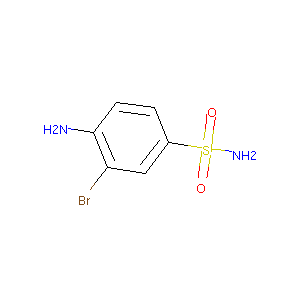Drug Information
| Drug General Information | |||||
|---|---|---|---|---|---|
| Drug ID |
D0P6AM
|
||||
| Former ID |
DNC004890
|
||||
| Drug Name |
4-Amino-3-bromo-benzenesulfonamide
|
||||
| Synonyms |
4-amino-3-bromobenzenesulfonamide
|
||||
| Indication | Discovery agent | Investigative | [1] | ||
| Structure |

|
Download2D MOL |
|||
| Canonical SMILES |
C1=CC(=C(C=C1S(=O)(=O)N)Br)N
|
||||
| InChI |
1S/C6H7BrN2O2S/c7-5-3-4(12(9,10)11)1-2-6(5)8/h1-3H,8H2,(H2,9,10,11)
|
||||
| InChIKey |
KQEVQYJWCZRLTJ-UHFFFAOYSA-N
|
||||
| Target and Pathway | |||||
| Target(s) | Carbonic anhydrase I | Target Info | Inhibitor | [2] | |
| Carbonic anhydrase IV | Target Info | Inhibitor | [3] | ||
| Carbonic anhydrase | Target Info | Inhibitor | [1] | ||
| Carbonic anhydrase II | Target Info | Inhibitor | [4] | ||
| Carbonic anhydrase XII | Target Info | Inhibitor | [5] | ||
| Carbonic anhydrase IX | Target Info | Inhibitor | [1] | ||
| Carbonic anhydrase VI | Target Info | Inhibitor | [1] | ||
| Carbonic anhydrase XIV | Target Info | Inhibitor | [6] | ||
| KEGG Pathway | Nitrogen metabolismhsa00910:Nitrogen metabolism | ||||
| Proximal tubule bicarbonate reclamationhsa00910:Nitrogen metabolism | |||||
| Proximal tubule bicarbonate reclamation | |||||
| Collecting duct acid secretion | |||||
| Gastric acid secretion | |||||
| Pancreatic secretion | |||||
| Bile secretionhsa00910:Nitrogen metabolismhsa00910:Nitrogen metabolismhsa00910:Nitrogen metabolismhsa00910:Nitrogen metabolism | |||||
| NetPath Pathway | IL4 Signaling Pathway | ||||
| EGFR1 Signaling PathwayNetPath_7:TGF_beta_Receptor Signaling Pathway | |||||
| Pathway Interaction Database | C-MYB transcription factor networkhif1_tfpathway:HIF-1-alpha transcription factor network | ||||
| PathWhiz Pathway | Gastric Acid Production | ||||
| Reactome | Erythrocytes take up carbon dioxide and release oxygen | ||||
| Erythrocytes take up oxygen and release carbon dioxide | |||||
| Reversible hydration of carbon dioxideR-HSA-1237044:Erythrocytes take up carbon dioxide and release oxygen | |||||
| Reversible hydration of carbon dioxideR-HSA-1475029:Reversible hydration of carbon dioxideR-HSA-1234158:Regulation of gene expression by Hypoxia-inducible Factor | |||||
| Reversible hydration of carbon dioxideR-HSA-1475029:Reversible hydration of carbon dioxideR-HSA-1475029:Reversible hydration of carbon dioxide | |||||
| WikiPathways | Reversible Hydration of Carbon Dioxide | ||||
| Uptake of Carbon Dioxide and Release of Oxygen by Erythrocytes | |||||
| Uptake of Oxygen and Release of Carbon Dioxide by ErythrocytesWP2770:Reversible Hydration of Carbon Dioxide | |||||
| miR-targeted genes in muscle cell - TarBase | |||||
| miR-targeted genes in leukocytes - TarBase | |||||
| miR-targeted genes in epithelium - TarBaseWP2877:Vitamin D Receptor Pathway | |||||
| Regulation of Hypoxia-inducible Factor (HIF) by OxygenWP2770:Reversible Hydration of Carbon DioxideWP2770:Reversible Hydration of Carbon Dioxide | |||||
| References | |||||
| REF 1 | J Med Chem. 2009 Feb 12;52(3):646-54.Cloning, expression, post-translational modifications and inhibition studies on the latest mammalian carbonic anhydrase isoform, CA XV. | ||||
| REF 2 | Carbonic anhydrase inhibitors. Inhibition studies of a coral secretory isoform by sulfonamides. Bioorg Med Chem. 2009 Jul 15;17(14):5054-8. Epub 2009 May 30. | ||||
| REF 3 | Bioorg Med Chem Lett. 2005 Feb 15;15(4):1149-54.Carbonic anhydrase inhibitors. Inhibition of the membrane-bound human and bovine isozymes IV with sulfonamides. | ||||
| REF 4 | Bioorg Med Chem Lett. 2009 Dec 1;19(23):6649-54. Epub 2009 Oct 7.Carbonic anhydrase inhibitors. Characterization and inhibition studies of the most active beta-carbonic anhydrase from Mycobacterium tuberculosis, Rv3588c. | ||||
| REF 5 | Bioorg Med Chem Lett. 2005 Feb 15;15(4):963-9.Carbonic anhydrase inhibitors. Inhibition of the transmembrane isozyme XII with sulfonamides-a new target for the design of antitumor and antiglaucoma drugs?. | ||||
| REF 6 | Bioorg Med Chem Lett. 2005 Sep 1;15(17):3828-33.Carbonic anhydrase inhibitors: inhibition of the transmembrane isozyme XIV with sulfonamides. | ||||
If You Find Any Error in Data or Bug in Web Service, Please Kindly Report It to Dr. Zhou and Dr. Zhang.

